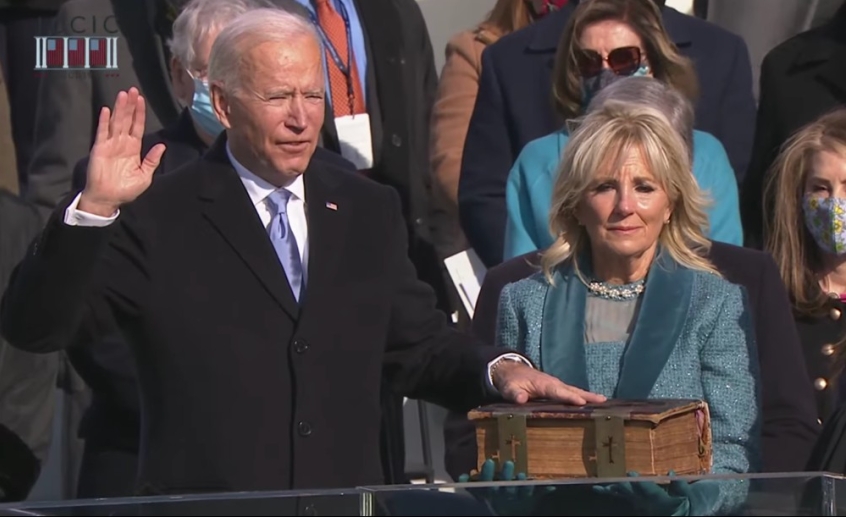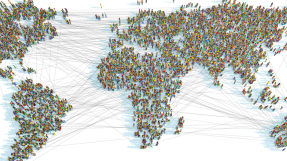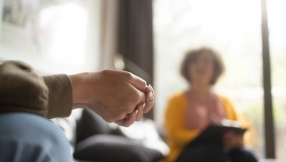
We are used to thinking about the importance of evangelicals in the politics of the modern USA. There's a reason for that. In 2016 about 81% of them voted for Donald Trump and played a major part in his election as president. In November 2020 about the same percentage voted for his re-election.
It should be noted that we are talking about white evangelicals, since black evangelicals are much more likely to vote Democrat and, in November 2020, over 80% of black evangelicals voted for Joe Biden. Race is the elephant in the room when it comes to Christian voting behaviour in the US. But what about Catholics?
The voting behaviour of US Catholics
Polling data, from March 2021, reveals that about 65% of the US adult population self-identify as Christian. Drilling down deeper reveals some important characteristics. Of the current US electorate, about 15% of registered-voters are evangelicals. However, 22% of the electorate are Catholics. This raises the question: why don't we talk more about the impact of the Catholic vote in the US?
The most obvious reason is because it does not constitute a solid bloc when it comes to voting behaviour. In 2020 about 50% voted Trump and 49% voted Biden. Drill down further, though, and it starts to get rather more like the race-based evangelical voting behaviour. When it came to white Catholics we find that 57% voted Trump, while 67% of Hispanic Catholics voted Biden. Trump did make some inroads into the Hispanic Catholic vote – particularly in places such as Florida – but the overall pattern is clear. Catholics, as a group, are divided when it comes to their voting behaviour. Consequently, the Catholic vote does not get the same air time among commentators as that accorded to white evangelicals. That might be about to change...
On 16 June, the US Conference of Catholic Bishops (USCCB) meets. In advance of that meeting, a number of bishops have been pushing for a policy that would deny communion to Biden and other politicians who adopt a 'pro-choice' position on the subject of abortion. We may soon be talking a lot more about the Catholic role in US politics. To deny communion to a sitting president would be an extraordinary act. It's not excommunication – but it is extremely serious. And this, for a president who is a committed, active and open Catholic.
The first Catholic president since the crucial year: 1973
The matter has arisen because, as well as being 'pro-choice', Biden is the first Catholic president since Kennedy (in office 1961–63). For the first time since the early 1960s, Catholic doctrinal and moral positions intersect with the very top of the political hierarchy in the US. And things have moved on since Kennedy's presidency ended so tragically in 1963. That was a decade before the Supreme Court judgment known as 'Roe v. Wade' (1973) set the basis for US abortion legislation. We live in a post-1973 situation. And we are about to be reminded of that with some force.
The push-back against 'Roe v. Wade' and 'Planned Parenthood of Southeastern Pennsylvania v. Casey' (1992) – the other key Supreme Court ruling in this area – has been building since the 1990s. However, it has accelerated in the 21st century. During the Trump presidency the campaign moved up a gear and was actively encouraged by Trump. Given that he had shifted his own position on this subject, some have argued that it was as much due to political opportunism on his part (courting his evangelical base) as a change of heart. We cannot make a window into Trump's soul, so we are unable to decide between those two options.
What is undeniable, though, is that the appointment of three conservatives to the Supreme Court during his presidency has shifted the balance of power in that highly politicised arm of the US state. The most recent appointment was Amy Coney Barrett, in October 2020. Conservative and Catholic, she may prove to be a highly significant appointment, if the subject of women's reproductive rights comes again before the Supreme Court.
It should be noted, however, that at her appearance before the Senate Judiciary Committee in 2017, concerning her nomination to the United States Court of Appeals for the Seventh Circuit, she stated that her personal church affiliation and religious beliefs would not bear on the discharge of her duties as a judge. 'Pro-choice' observers were not mollified by this and, in October 2020, she was the first Supreme Court judge since 1870 to be confirmed without gaining a single vote from the (then) Senate minority party (Democrats). Which brings us back to the Catholics.
The position being promoted by some bishops has set alarm bells ringing in the Vatican. As a result of what is being mooted, Cardinal Luis Ladaria (Prefect of the Vatican's Congregation for the Doctrine of the Faith), issued a clear warning to the US bishops. In a letter to Archbishop José Gomez of Los Angeles, president of the USCCB, Ladaria stated that the proposed policy "requires that dialogue occurs in two stages: first among the bishops themselves, and then between bishops and Catholic pro-choice politicians within their jurisdictions."
We might paraphrase this as: do not rush into this. He also advised that if such a policy lacked unanimous support among the bishops (a highly likely scenario), it would become "a source of discord rather than unity" among both bishops and church members. It also has an international dimension, since such a policy should also involve negotiation with bishops' conferences in other countries. In addition, he indicated that such a decision could not be limited to political leaders but would also affect ordinary Catholics too.
What Ladaria did not allude to was data from Pew Research Center, in 2019, which revealed that 56% of US Catholics thought abortion should be legal in all or most cases. About two-thirds of them opposed overturning 'Roe v. Wade'. On top of this, many also believe that, important as abortion and euthanasia are as moral issues, they do not constitute the only serious moral matters facing Catholics, although the statements of conservatives can make it appear this way. As with their voting behaviour, Catholics do not constitute a monolithic bloc.
The issue has the ingredients of a bitterly divisive conflict. And this in a community deeply disillusioned with their Church due to the uncovering of historic sexual abuse and where under 40% of US Catholics now regularly attend church. Furthermore, many observers see the proposed ban as also representing a conservative Catholic push-back against Pope Francis, who is regarded as too 'progressive' and ecumenical on a number of issues. Both Biden and Francis may be in the sights of some bishops.
Whatever the Catholic bishops decide (and they could yet cut the proposal from the USCCB agenda), this matter is not going to go away. This conflict, that has the potential to split the Catholic Church, is also part of a much wider phenomenon.
The next stage in the culture war gripping the USA
A backlash against 'Roe v. Wade' is building in Republican-inclined states. A number of these states have recently passed legislation designed to restrict access to abortion, in a strategy clearly designed to force the matter back before the Supreme Court. This has occurred in Mississippi, where the case of 'Dobbs v. Jackson Women's Health Organisation' has, in the past month, been granted a hearing before the Supreme Court. It concerns a 2018 state law that would ban abortions after the 15th week of pregnancy.
Comparable acts have been passed in Republican Texas, that would ban abortions almost entirely. These will face many legal challenges and may also end up before the Supreme Court in due course. Similar, so-called 'trigger laws', are ready to go into effect in a dozen other Republican states if 'Roe v. Wade' is overturned.
What is clear is that this issue has the potential to dominate US political and legal debate in the months ahead and has implications for the worldwide Catholic Church and the wider Christian community. Even if President Biden avoids a confrontation with the Catholic bishops over the matter, it may yet be the Catholic justice, Amy Coney Barrett, who proves crucial in deciding the future of reproductive rights in the USA. Either way, Catholicism looks set to make an impact on US politics this year.
Martyn Whittock is an evangelical and a Licensed Lay Minister in the Church of England. As an historian and author, or co-author, of fifty-two books, his work covers a wide range of historical and theological themes. In addition, as a commentator and columnist, he has written for a number of print and online news platforms; has been interviewed on radio shows exploring the interaction of faith and politics; and appeared on Sky News discussing political events in the USA. His most recent books include: Trump and the Puritans (2020), The Secret History of Soviet Russia's Police State (2020), Daughters of Eve (2021) and Jesus the Unauthorized Biography (2021).













